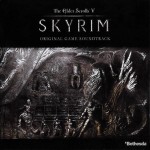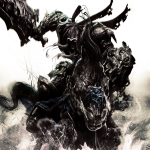PM Studios brought DJ Max Fever to North America, and it marks the first time a console-based DJ Max game is officially released here in the US (the other games have “International Versions” that work on American PSPs, but were technically import products). Korean developer “Pentavision” created a sleeper-hit of a rhythm game that has really started to catch on in East Asia. And Americans who want to jump in on the latest rhythm game have the opportunity with one fantastic collection.
You see, in East Asia (Korea and Japan), multiple DJ Max games were released on PSP. DJ Max Portable and DJ Max Portable 2 each had over 50 songs. The “best” tracks from each of those two games were merged to create the North American DJ Max Fever. The soundtrack features music from a group of fantastic composers, most of whom are Korean. Among the many great composers on here, I have to give props to ESTi and Nauts, the prolific composers whom I (and many other fans) first encountered through Ragnarok Online nearly a decade ago.
In this review, we’ll be analyzing not just the music, but also the gameplay for this unique rhythm game. All of this comes, of course, after the jump.
So, I think I like DJ Max Fever. But I want to start by complaining about the three things I really *don’t* like about this game:
1) It sucks the life out of your PSP’s batteries faster than any other game I’ve played.
2) The game is reported to have a multitude of glitches (though I personally only experienced a few of them).
3) DJ Max games have made me realize just how much I suck at rhythm games.
Let’s start with the last of my three objections to the game. This game is hard! And I’d like to argue that the button layout on the PSP is the primary problem. I’m a big dude, and I have big hands. Being nimble on a PSP is not my forte. So when I’m trying to hit up, left, and square simultaneously, followed by some L+R tapping, and then a quick spin on the analog button, and I tend to fumble the whole process up and fail in one devastating moment, even after performing to near-perfection for a good minute before.
Two things have been done to try and make this game more “newbie-friendly.” The first was done by the developer themselves. Pentavision offers a large variety of modes. You can play using 4, 5, 6, or 8 buttons, and you can also play on Easy, Normal, or Hard difficulty. From there, each song has a ranked difficulty, and some songs can be attempted on multiple difficulty levels (Normal, Hard, Max). Each of these categories adds a new dimension to the difficulty level. Obviously, the biggest jump is from one button mode to the next. With “four button” (which I’m going to refer to as “standard gameplay,” since it’s the only thing I’m any good at), you use left, up, triangle, and circle to match the four columns of notes to hit as they come down. Five buttons adds a “center” column, which can be activated by pressing *either* right or square. Six-button mode splits the entries for right and square. Finally, eight-button mode adds L and R to the mix, and when the scroll-down screen shows them, these buttons take up the three spaces that would go to the left or right side of the six-button layout (i.e. – “L” covers the D-pad, and “R” covers the shape buttons). I can’t handle most songs that go beyond the 4-button mode, and yes, I am ashamed to admit that.
The “Easy/Normal/Hard” mode (which you set in an options menu) basically messes with the mathematical programming behind the game. The harder your difficulty, the more points you can earn. However, harder difficulty also demands greater accuracy. On Easy mode, you can get away with using the wrong button to hit a note, with minimal accuracy penalty. By the time you reach hard, you can’t get away with doing that. Everything has to be exact. Hitting a note one tenth of a second too early or late will be noted in hard mode, and it decreases your accuracy. Yikes!
Finally, the individual songs’ difficulty rankings go from 1 to … the highest I saw was 15, but it might go to 20. Most songs only have one or two available difficulty levels, and that level changes depending on which button mode you enter. For example, there are no “Max” difficulty songs in 4-button; on 8-button, there are more “Max” difficulty songs than the medium “Hard.” These changes in difficulty basically mean increased notes, more complex note patterns, etc. It’s like the difficulty difference on DDR or Guitar Hero.
So, thanks to the extreme level of customization in difficulty, a novice like myself can get by. Thanks, Pentavision, for that!
PM Studios made some further adjustments. The “mission mode” objectives have been lowered in many cases, and PM generally messed with the programming so that the game would be slightly easier. This, for me, just adds insult to injury. It’s like, I know that I suck at this game, but the worst thing about it is that I suck at a slightly dumbed-down version of the game! Imagine me playing the International Import! I would fail songs non-stop. I might not be able to fully complete 4-button mode! That’s a scary thought for a perfectionist like myself.
There’s a WiFi multiplayer mode (which I never experienced because, apparently, no one wants to play on a Sunday afternoon). There are menus/modes where you can just listen to the soundtrack or watch the awesome animated “music videos” that are displayed in the background for each song. But guess what isn’t on here? That’s right, a tutorial.
Open your instruction booklet, because it’s the closest thing to an explanation that you’re going to get. I had no idea what I was doing when I started playing this game. Even now, I’m not sure I fully understand how the game operates. I have a good feel for the difficulty levels, and I know that I can equip different characters, gear, and button icons to improve my earning of gold, experience points, etc. But I’m sure there are plenty of things about this game I simply don’t understand. After all, I’m still a novice.
As you complete songs, you earn experience points that allow you to level up, and gold. Leveling up gives you access to new items (characters/gears/buttons), as well as new missions. I really enjoy the smooth progression of difficulty that takes place as you unlock a variety of new game modes and bonuses. That said, once you hit a wall and find out you’re simply not good enough to progress, the game becomes extremely frustrating. Thank God I was bestowed the patience and self-control to *not* throw my PSP out the window after playing this game for hours, failing song after song.
But that’s all the more I want to say about the game. Let’s get into the music!
First of all, it is a crime against audiophiles everywhere that a separate soundtrack release is not widely available. Both DJ Max Portable and DJ Max Portable 2 have had soundtrack releases, but only inside larger limited edition promotional sets (which we’ve written two news stories about). Why haven’t they been printed separately and sold in a public setting? I would totally buy it. There’s so much good music here, it’s ridiculous.
Let’s start with ESTi and Nauts. Nauts only contributed two songs to the game, but they are quite memorable. “Sunset Rider” is a peppy and memorable piece, and the music video that goes with it is cute in a “high school anime” kind of way. Nauts’ other contribution, “Mess it up,” is a completely different style song, with in-your-face hip-hop techno fusion goin’ on. The title was rather fitting, however, when I tried to play the song in six-button mode. I certainly did “mess it up.”
ESTi’s additions to the game are fantastic. The game’s presumed “hardest piece” is written by him. “SIN ~The Last Scene~” was written and published for the first DJ Max Portable, and it carries over into DJ Max Fever presumably because it’s so memorable. And, as I said before, it is super-hard. It’s Guitar Hero‘s Dragon Force, but with a decidedly drum’n’bass techno feel, on a PSP. Ouch. My fingers hurt.
ESTi also had his songs “Ladymade Star,” “Ray of Illuminati,” and “Oblivion.” Of these songs, I have to give props to “Ladymade Star.” Along with being a very catchy tune, the music video for it is a lot of fun.
Much as I love the patron saints of Korean VGM, there are some other artists whose work I had never experienced before, and I am now a big fan. First up, major props to artist M2U for writing the song “Blythe.” And props to the guys who did the music video for it as well! This song is just insanely catchy. It’s a synth-based drum’n’bass piece, and it has a super-fast tempo, and the song plays out as a steady stream of 8th notes, with only the occasional interruption. The song is extremely catchy, the English vocals work very well (*and* they make sense, which is more than we can say for the song “A Lie”). “Blythe” by M2U. Look it up. Check it out. Great song!
I like that each song, combined with the music video, tends to tell a story. For example, who would’ve thought that I would enjoy ND Lee’s “ON,” which is apparently a Yaoi celebration (see the music video, two dudes checkin’ each other out like crazy). Good stuff. While we’re on the topic of sexual identity, the androgynous characters shown in Forte Escape’s “Elastic Star” also left a distinct visual impression in my mind. The song itself, which is described as being in the “Acid House” genre, stuck with me as well.
There are exactly 50 songs on DJ Max Fever, pulling from both of the “Portable” games in Korea. Note that you have access to 49 songs, but the opening music video “Be Your Own Miracle” (which makes me think of the movie “Bruce Almighty”) can be played at the end of a 4-song “career mode” play if you have high enough accuracy…so that’s the 50th song. If there’s one thing I’d really like, it would be the rest of the music from those two games. Perhaps as DLC? I’d buy whatever-size memory card I’d need to have them as well.
In conclusion, if you’ve never played a DJ Max game, I warn you that it is rather addictive, but that you’re screwed if you’re not good at rhythm games. If you thought Guitar Hero was a hard game (hint: it’s not), then you need to stay the hell away from DJ Max Fever. Even its easiest modes are challenging. It’s an unforgettable game, but only the most hardcore gamers, with a special doctorate in rhythm-game ass-kicking, will be able to conquer this game. But even if you struggle as much as I did with the game’s difficulty, the soundtrack and music videos alone make it a worthwhile purchase. This is a great collection of instrumental and vocal tunes from (mostly) Korean artists. You wouldn’t want to miss out on that.
(below is the video for M2U’s song “Blythe.” Apparently, M2U is four years younger than I am. Wow…)
Tags: DJ Max, DJ Max Fever, ESTi, Korean, Nauts, Pentavision, PM Studios, PSP, Reviews, Rhythm, Videogame









































I really want that 3-disc soundtrack they put out in the collectors boxes. Korean composers write some great music for sure. This game sounds way too hard and would make me feel like I suck, too.
Your review gave me one more reason to finally get me a PSP (the other is MGS: Peace Walker). I’ve always liked rhythm games, even though I’m not that great at them. The first were DDR games for the first PlayStation and some Beatmania, but I played so much my dancing mat broke (and by that time my neighbours would hit my walls so as to make me stop the damn jumping on the floor, which apparently made a lot of noise and them upset). Guitar Hero was fun for some time, but I’ve never been too much into popular rock music.
So I think this might be just the thing for me, and as a plus it doesn’t involve buying yet another huge chunk of plastic which I’ve had my fair share of. AND I’m a fan of Korean game music, mostly because of TalesWeaver and Granado Espada (when’s that game going to get a proper soundtrack release, damn it!).